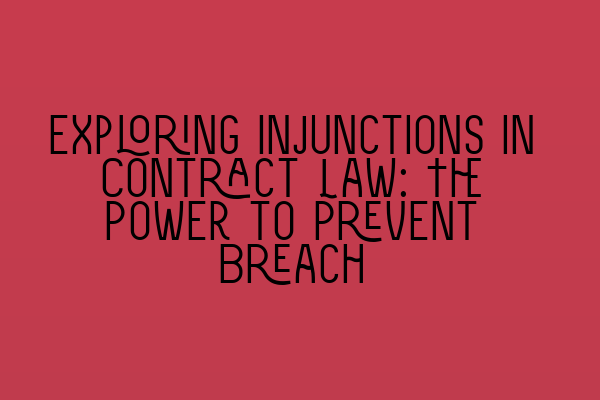Exploring Injunctions in Contract Law: The Power to Prevent Breach
In contract law, one crucial element that parties rely on is the assurance that the terms of the contract will be upheld by all parties involved. However, there are instances where one party may be contemplating or initiating actions that could potentially breach the contract. This is where the power of injunctions comes into play.
An injunction in contract law is a court order that restrains a party from performing certain actions outlined in the contract. It serves as a preemptive measure to prevent or stop a breach from occurring, thereby preserving the rights and interests of the aggrieved party.
Let’s delve deeper into the significance of injunctions in contract law and understand their various types and applications.
Types of Injunctions in Contract Law
1. Permanent Injunctions: The most commonly known type of injunction is a permanent injunction. It is issued when a breach has already occurred, and the court deems it necessary to prohibit the party from continuing with the breach. Permanent injunctions are typically sought when monetary damages alone would not adequately compensate for the harm caused by the breach.
2. Interlocutory Injunctions: Interlocutory injunctions, also known as temporary injunctions, are granted during the pendency of a legal dispute. These injunctions are typically sought when there is an immediate or urgent need to prevent irreparable harm before the final resolution of the case. Interlocutory injunctions aim to maintain the status quo until a final decision is reached.
3. Mandatory Injunctions: While injunctions are generally prohibitive in nature, a mandatory injunction requires a party to take specific actions as outlined in the contract. This type of injunction is sought when the aggrieved party wants to ensure that the breaching party fulfills its obligations under the contract rather than simply stopping the breach.
Applications of Injunctions in Contract Law
1. Non-Compete Agreements: In the context of employment contracts, non-compete clauses are often included to protect the interests of the employer. If an employee breaches this clause by joining a competitor or starting a competing business, the employer can seek an injunction to prevent such actions.
2. Confidentiality Agreements: Confidentiality agreements are common in many industries to protect sensitive information. If a party breaches this agreement by disclosing confidential information, the other party can seek an injunction to stop the unauthorized disclosure and maintain confidentiality.
3. Specific Performance: In cases where monetary damages would be inadequate, a court may grant an injunction for specific performance. This means that the breaching party is compelled to fulfill their contractual obligations exactly as outlined in the agreement. Specific performance is often sought in unique or rare situations where the subject matter of the contract is irreplaceable.
Incorporating SEO Keywords: SQE Contract Law
Understanding the fundamental principles of contract law, including injunctions, is essential for any aspiring solicitor preparing for the Solicitors Qualifying Examination (SQE). The SQE is a necessary step for individuals looking to become qualified solicitors in England and Wales.
If you are currently preparing for the SQE, it is crucial to familiarize yourself with various aspects of contract law, including the power of injunctions. For relevant practice materials, such as practice exam questions and mocks, check out these related articles:
– [SQE 1 Practice Exam Questions](https://fqps.co.uk/sqe/sqe1-preparation/mcq-practice-quiz)
– [SQE 1 Practice Mocks FLK1 FLK2](https://fqps.co.uk/sqe/sqe1-preparation/practice-mocks-quiz)
Additionally, you can explore the SQE preparation courses offered to ensure that you are fully equipped with the knowledge and skills required to excel in your SQE exams:
– [SQE 2 Preparation Courses](https://fqps.co.uk/sqe/sqe2-preparation)
– [SQE 1 Preparation Courses](https://fqps.co.uk/sqe/sqe1-preparation)
Stay informed about the latest SRA SQE exam dates to plan your preparation effectively:
– [SRA SQE Exam Dates](https://fqps.co.uk/sqe/sqe1-sqe2-exam-dates)
Conclusion
Injunctions in contract law play a vital role in preventing breaches and safeguarding the rights and interests of parties involved in a contract. Understanding the different types of injunctions and their applications is essential for any legal professional or aspiring solicitor.
If you are preparing for the SQE exams, make sure to explore the related articles and prepare yourself adequately to tackle contract law questions. Remember, staying knowledgeable and well-prepared is the key to success in your legal career.
